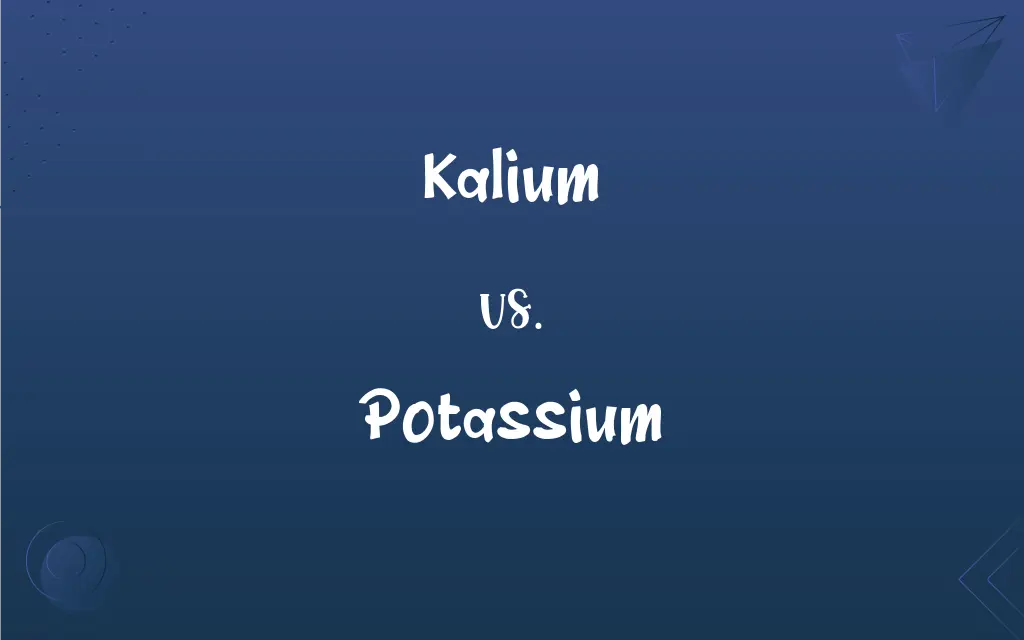Kalium vs. Potassium: What's the Difference?
Edited by Harlon Moss || By Janet White || Published on December 16, 2023
"Kalium" and "potassium" refer to the same chemical element (symbol K), with "kalium" being the Latin and German name, and "potassium" the English name.

Key Differences
"Kalium" is the term used for potassium in several languages, derived from the Latin "kalium," indicating its historical roots. Potassium, on the other hand, is the English term for this element, derived from potash, the substance from which it was first isolated.
In the periodic table, "kalium" and "potassium" are represented by the symbol 'K', originating from the Latin "kalium." While "kalium" reflects the element's scientific and historical nomenclature, "potassium" is more commonly used in English-speaking countries and in international scientific literature.
"Kalium" is commonly used in German and several other European languages. Potassium, however, is used in English and is recognized globally in scientific communities, making it the standard term in English-language chemistry education and literature.
The term "kalium" reflects the element's historical discovery and naming conventions, rooted in alchemy and early chemistry. Potassium's name, conversely, is linked to its early extraction from potash (pot-ash), a substance derived from plant ashes soaked in pots.
Both "kalium" and "potassium" refer to the same element, known for its reactivity with water and important role in biological systems. While "kalium" is often used in historical or language-specific contexts, "potassium" is universally recognized in the international scientific community.
ADVERTISEMENT
Comparison Chart
Language Origin
Latin and German
English
Use in Languages
Used in German and other European languages
Commonly used in English and international texts
Historical Context
Reflects historical naming conventions
Derived from potash, its original source
Scientific Recognition
Less recognized in modern science
Universally recognized in modern science
Role in Education
Used in specific language contexts
Standard in English-language chemistry education
ADVERTISEMENT
Kalium and Potassium Definitions
Kalium
Element with atomic number 19 in Latin nomenclature.
Kalium reacts vigorously with water.
Potassium
An alkali metal, reactive and soft.
Potassium reacts explosively with water.
Kalium
Used in the periodic table in some languages.
Kalium's symbol on the periodic table is 'K'.
Potassium
Essential for plant growth and animal health.
Potassium is a key component of fertilizers.
Kalium
Latin name for the element potassium.
Kalium was first isolated from potash.
Potassium
Obtained historically from potash.
Early potassium was derived from potash.
Kalium
The German term for potassium.
Kalium is essential for plant growth.
Potassium
A chemical element with symbol K and atomic number 19.
Potassium is a vital nutrient for living organisms.
Kalium
Historical term for potassium in alchemy.
Alchemists referred to potassium as kalium.
Potassium
Used in various industrial and medical applications.
Potassium compounds are used in glass manufacturing.
Kalium
(obsolete) potassium.
Potassium
A soft, silver-white, extremely reactive element that is an alkali metal, is essential to plant and animal cell functions, and occurs in nature only in compounds. It can be obtained by electrolysis of its hydroxide and is found in, or converted to, a wide variety of salts used especially in fertilizers and soaps. Atomic number 19; atomic weight 39.098; melting point 63.5°C; boiling point 759°C; specific gravity 0.86; valence 1. See Periodic Table.
Kalium
Potassium; - so called by the German chemists.
Potassium
A soft, waxy, silvery reactive metal that is never found unbound in nature; an element (symbol K) with an atomic number of 19 and atomic weight of 39.0983. The symbol is derived from the Latin kalium.
Potassium
(countable) A single atom of this element.
Potassium
An Alkali element, occurring abundantly but always combined, as in the chloride, sulphate, carbonate, or silicate, in the minerals sylvite, kainite, orthoclase, muscovite, etc. Atomic weight 39.0. Symbol K (Kalium).
Potassium
A light soft silver-white metallic element of the alkali metal group; oxidizes rapidly in air and reacts violently with water; is abundant in nature in combined forms occurring in sea water and in carnallite and kainite and sylvite
FAQs
Why is potassium called kalium in some languages?
"Kalium" is derived from Latin and is used in languages like German.
Why does kalium have the symbol 'K'?
'K' comes from the Latin name, kalium.
What is the symbol for kalium/potassium?
The symbol is 'K' for both.
Can I find kalium in food?
Yes, it's present in many foods as potassium.
Are kalium and potassium the same element?
Yes, they are different names for the same element.
Is potassium important for plants?
Absolutely, it's vital for plant growth.
Was potassium discovered from potash?
Yes, it was first isolated from potash.
Do chemists use kalium or potassium?
Mostly potassium, especially in English-speaking countries.
Are potassium supplements common?
Yes, they are widely used for health purposes.
Is potassium a common element in the human body?
Yes, it's essential for various bodily functions.
Is potassium reactive?
Yes, especially with water.
Why is potassium essential for animals?
It plays a key role in nerve function and muscle contraction.
Is potassium used in industry?
Yes, in various applications like fertilizers and glass making.
Is kalium used in modern chemistry?
Less so; potassium is the more commonly used term.
Does the body need potassium?
Yes, it's crucial for maintaining cellular function.
Can kalium be toxic?
In high amounts, as with potassium, it can be harmful.
Does kalium occur naturally?
Yes, as potassium, it's abundant in the earth's crust.
Are there different isotopes of potassium?
Yes, including some that are radioactive.
Is potassium part of the periodic table?
Yes, it's element number 19.
Can I overdose on kalium/potassium?
Yes, excessive intake can be dangerous.
About Author
Written by
Janet WhiteJanet White has been an esteemed writer and blogger for Difference Wiki. Holding a Master's degree in Science and Medical Journalism from the prestigious Boston University, she has consistently demonstrated her expertise and passion for her field. When she's not immersed in her work, Janet relishes her time exercising, delving into a good book, and cherishing moments with friends and family.
Edited by
Harlon MossHarlon is a seasoned quality moderator and accomplished content writer for Difference Wiki. An alumnus of the prestigious University of California, he earned his degree in Computer Science. Leveraging his academic background, Harlon brings a meticulous and informed perspective to his work, ensuring content accuracy and excellence.







































































